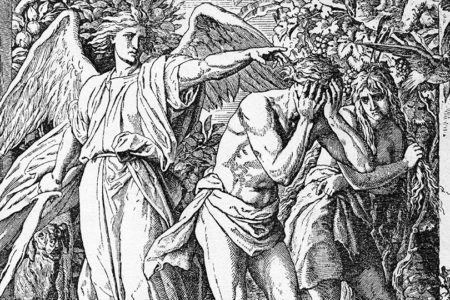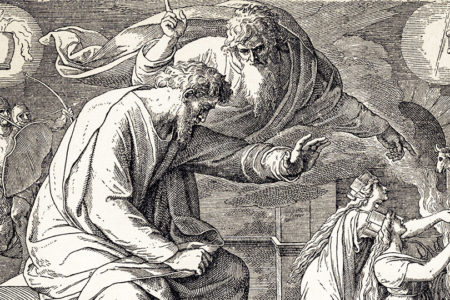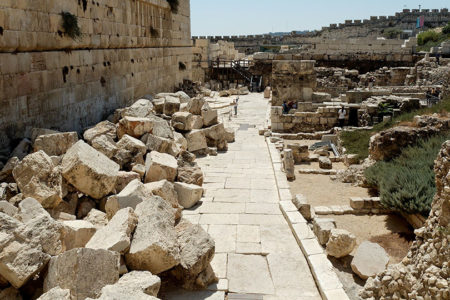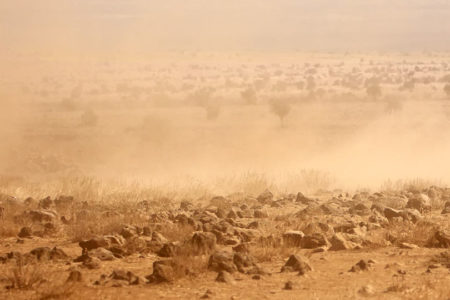Messiah’s Coronation and Reign
Zechariah 6:1-15
What a long night Zechariah must have experienced. He had already received seven apocalyptic visions unveiling Israel’s future, and the eighth was soon to come. This final vision would reveal God’s judgment of the nations, symbolized by war chariots covering the earth.
After these visions, Joshua was crowned high priest. Although it was only a symbolic act, his crowning was meant as a type or foreshadowing of the Messiah, who will be crowned both Priest and King at His return.
The revelation given in chapter 6 is a fitting culmination to the night visions, outlining prophetic events that the Messiah will perform, events described more fully in this article.
The Chariots of Judgment
Zechariah began by unveiling his eighth vision from God: “Then I turned and raised my eyes and looked, and behold, four chariots were coming from between two mountains, and the mountains were mountains of bronze” (v. 1).
The first and eighth visions are similar, but differences do exist. In vision one, horsemen are on a reconnaissance patrol to evaluate the Gentile world that is living in peace; in vision eight, horse-drawn chariots arrive to implement judgment. In both visions the horses are similar, yet different in color. In vision one the horses stand in a ravine among the myrtle trees; in vision eight they emerge from between two mountains made of bronze.
Although the bronze mountains are often identified as Mount Zion and the Mount of Olives, the text is silent on their actual identity. Obviously, they are to be interpreted symbolically. In Scripture, bronze symbolizes God’s divine righteousness and judgment. For example, the bronze serpent held up in the wilderness related to the judgment of sin (Num. 21:9). The description of Messiah’s feet as being “like fine brass [bronze]” (Rev. 1:15) speaks of His judicial character in judging His enemies.
In verses 2 and 3, the four horse-drawn chariots that come from between these two bronze mountains symbolize God’s universal judgment. The colors of these horses are not explained in Zechariah. But Revelation 6:1–8 sheds light on the significance of colored horses: Red symbolizes war; black, famine and death; and white, conquest and victory. There is no “dappled” horse (v. 3) in Revelation 6, but in Zechariah it may represent plagues and pestilence poured out on the earth. The black horses travel north, the white horses follow, and the dappled horses go south. Zechariah did not comment on the direction of the red horses.
Zechariah asked, “What are these, my lord?” (v. 4). The angel revealed that these horses represent “four spirits [winds] of heaven, who go out from their station before the Lord of all the earth” (v. 5). These are angelic beings from heaven, ministers of God assigned to implement judgment on the rebellious nations of the world prior to christ’s return.
The strong horses were straining at the bit, “eager to go” (v. 7) and patrol the earth. The angel, speaking for God the Father, gave the order, “Go, walk to and fro throughout the earth” (v. 7), in readiness to implement judgment. Note that the mission is orchestrated by God himself.
The Lord called to Zechariah, “Those who go toward the north country have given rest to my Spirit in the north country” (v. 8). That is, they appeased God’s wrath by executing His judgment on the nations. This prophecy anticipates the future day of the Lord’s judgment in the Great Tribulation when God will destroy the evil system of babylon and all Israel’s enemies (cf. 5:5–11; Rev. 17—18). Only then will God’s Spirit be appeased and have complete rest.
The Crowning of Joshua
After the night visions Zechariah received further instruction:
Then the word of the Lᴏʀᴅ came to me, saying: “Receive the gift from the captives—from Heldai, Tobijah, and Jedaiah, who have come from Babylon—and go the same day and enter the house of Josiah the son of Zephaniah” (vv. 9–10).
The text does not reveal when the instruction was given to Zechariah, but it must have been soon after the eighth vision.
The gift bearers were former Jewish captives from Babylon who did not return to Jerusalem under Zerubbabel (537 B.C.), Nehemiah (445 B.C.), or Ezra (458 B.C.). The Jewish delegation brought an offering of gold and silver to the Lord for the restoration of the second Temple.
Zechariah was to fashion an “elaborate crown” from the silver and gold and “set it on the head of Joshua the son of Jehozadak, the high priest” (v. 11). The word crown in Hebrew is plural and should be translated “crowns.”
Some teach that the crown possessed several circlets that formed a single crown. Others believe the term refers to a second crown made for Zerubbabel. However, a crown for Zerubbabel was out of the question because he was not a priest or a king, but only a governor. To crown Zerubbabel the king of Israel would have been a premature attempt to restore the Davidic kingdom. No king in Israel’s history was ever allowed to serve as both king and priest. That role is reserved for the Messiah alone. When King Uzziah entered the Temple in a priestly role, he was severely judged by God and became a leper until his death (2 Chr. 26:16–21).
I believe this is a double-ringed crown, symbolic of the priestly and kingly diadem the Messiah will wear at His coronation. Thus Joshua’s crowning was a type or foreshadowing of the Messiah’s crowning as both priest and King. What a fitting conclusion to the eighth vision in Zechariah.
The crown placed on Joshua’s head would be housed in the Temple for a memorial: “Now the elaborate crown shall be for a memorial in the temple of the Lᴏʀᴅ for Helem, Tobijah, Jedaiah, and Hen [hen means “graciousness” and is a nickname for Josiah] the son of Zephaniah” (v. 14). The ceremonial crown was to be kept in the Temple as a reminder of the Jewish delegation from Babylon that brought the gift to Jerusalem for the restoration of the Temple. It would also remind Israel of the teaching that one day messiah will appear and be crowned the King-priest of Israel.
Abruptly, Zechariah is commanded to deliver a message to Joshua: “Then speak to him [Joshua], saying, ‘Thus says the Lᴏʀᴅ of hosts, saying: “behold, the man whose name is the ʙʀᴀɴᴄʜ!”’” (v. 12). The word Branch is a Messianic title used four times in the Old Testament.
A number of prophecies are given concerning the Messianic branch.
First, Messiah the Branch “shall branch out” (v. 12). Although He came at the First Advent as “a tender plant, And as a root out of dry ground” (Isa. 53:2), the Messiah would shoot upward; branch out as a strong, fast-growing plant; and be elevated to great heights.
Second, Messiah the Branch “shall build the temple of the LORd” (v. 12). This verse does not refer to the Second Temple that Zerubbabel constructed in 516 B.C. but to the Millennial Temple that will be constructed at Messiah’s Second Coming (Isa. 2:2–4; Ezek. 40—42; Hag. 2:7–9).
Third, Messiah the Branch is to “bear [carry] the glory” (v. 13). The word glory refers to the majesty and splendor of God (ps. 96:6). In the Millennial Kingdom, the Messiah will finally receive the honor, majesty, and glory due Him and reign with regal splendor as both King and 0riest.
Fourth, Messiah the Branch “shall sit and rule on His throne” in the city of Jerusalem (v. 13). Having dispossessed Satan and his demons from their control of Earth, the Messiah will reclaim the planet as its Creator-Redeemer, sit on the throne of His father David (Lk. 1:32), and rule in righteousness with a rod of iron.
Fifth, Messiah the Branch will “be a priest on His throne, and the counsel of peace shall be between them both” (v. 13). The Messiah will not only exercise His Kingly role, but His Priestly role as well. He is not a priest from the Levitical, Aaronic priesthood but after the order of Melchizedek, king of Salem, who was both a king and priest (Ps. 110:4; Heb. 7).
Today Jesus the Messiah is seated at the right hand of God the Father, exercising only His Priestly role (Heb. 8:1–2). Tension and rivalry existed between Israel’s king and priest throughout the nation’s history. But in the Millennium both offices will reside in Messiah the Branch, who will function as a King-Priest, reconciling both positions and bringing peace to the world (Isa. 9:6; 11:1–2; 66:12).
Sixth, Messiah the branch will build the Temple with gifts donated by righteous Gentiles: “Even those from afar shall come and build the temple of the Lᴏʀᴅ. Then you shall know that the Lᴏʀᴅ of hosts has sent me to you” (v. 15). In other words, like the Jewish delegation from Babylon, Gentiles will bring gifts to Jerusalem; and the Messiah will use them to construct the Millennial Temple (Isa. 2:2–3; 60:5, 9, 11; 61:6). When the nations bring their wealth to Jerusalem, the entire world will know that God the Father sent the Messiah to Israel to build the Millennial Temple.
Zechariah stated, “And this shall come to pass if you diligently obey the voice of the Lᴏʀᴅ your God” (v. 15). This word was first uttered by Moses in Deuteronomy 28:1 when God promised to bless Israel if the nation obeyed His commandments once it entered the land of Canaan. At first glance, God’s promise to Israel in verse 15 seems conditional and based on obedience to the Lord. However, such is not the case because the Messiah’s rule and the Temple’s construction are settled in God’s sovereign plan. Zechariah was saying that an individual’s participation in the Millennial Kingdom blessings will depend on that person’s obedience to the Lord.
What is said about the branch corresponds to what is presented about christ in the four Gospels of the New Testament.
- The Branch as Royal King. “I will raise to David a branch of righteousness; a King shall reign and prosper, and execute judgment and righteousness in the earth” (Jer. 23:5). This description corresponds to the Messiah’s presentation as a righteous King in Matthew.
- The Branch as Servant (Zech. 3:8). Messiah is clearly identified as the Servant of the Lord, who came to do the Father’s will by redeeming humankind (Isa. 42:1; 49:3–4; 50:10; 52:13; 53:11). This description corresponds to Messiah as a servant in Mark 10:45.
- The Branch as Fully Man. “The man whose name is the ʙʀᴀɴᴄʜ!” (Zech. 6:12) corresponds to the presentation of the Messiah in Luke.
- The Branch as Fully God. “The branch of the Lᴏʀᴅ” (Isa. 4:2) corresponds to the Messiah as the Son of God in John.1
These eight prophetic visions provided an overview of God’s plan for Israel, keeping hope alive within the nation that one day its messiah would come, be crowned both King and priest, and fulfill all the prophecies described in these first six chapters.
ENDNOTE
- Walter c. Kaiser, The Preacher’s Commentary, ed. Lloyd J. Ogilvie, vol. 23, Micah–Malachi (Nashville: Thomas Nelson, 1992), 335.






